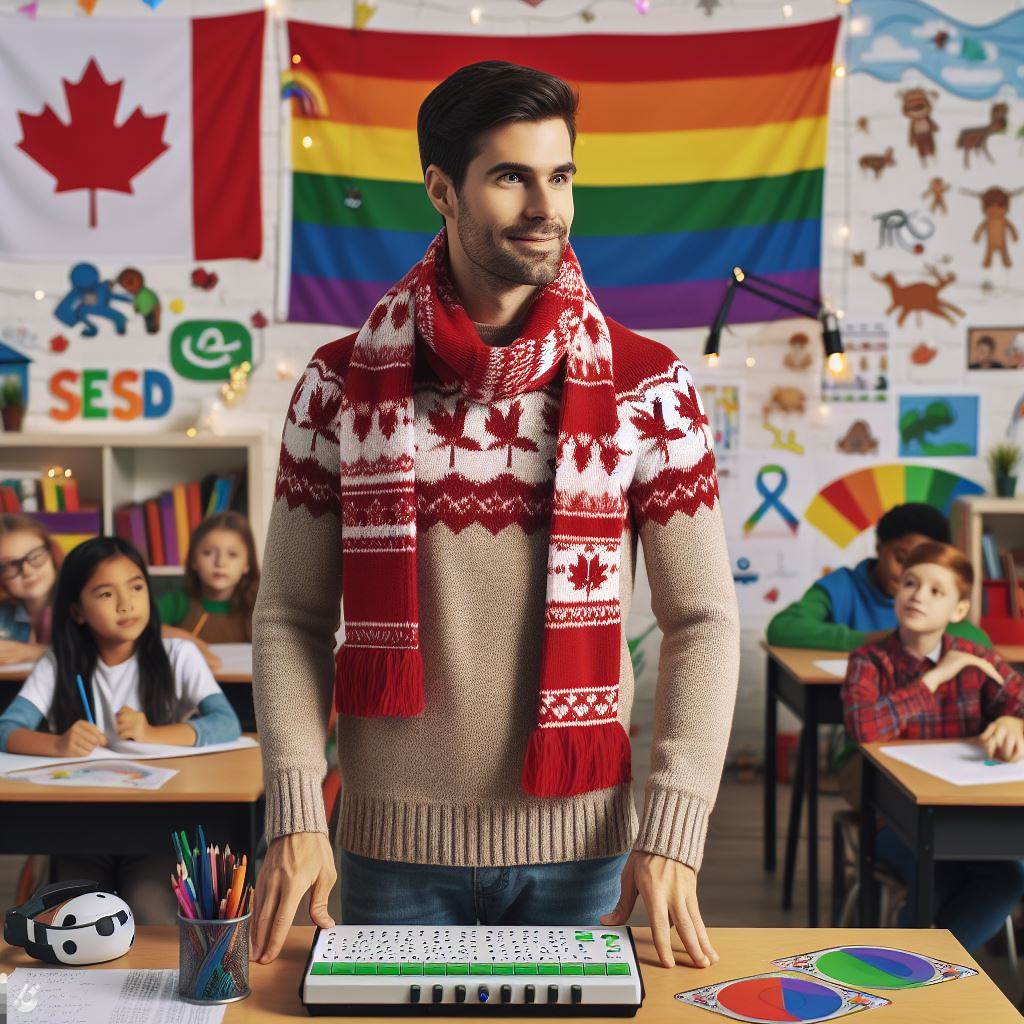Introduction
The Canadian education system is known for its commitment to providing quality education to all students.
From primary to higher education, the system aims to equip students with the necessary skills and knowledge to succeed in a rapidly changing world.
One crucial aspect of this education system is its emphasis on inclusive education.
Inclusive education recognizes the diversity of students and aims to create an inclusive learning environment that values and accommodates all learners.
It promotes equal opportunities, fosters respect for differences, and helps students develop a sense of belonging.
Inclusive education is not just beneficial for students with disabilities or special needs, but it also benefits all students.
It prepares them for the real world where they will interact with people from diverse backgrounds.
In this blog post, we will delve into the role of Canadian teachers in implementing inclusive education practices.
Canadian teachers play a crucial role in ensuring that all students, regardless of their abilities or backgrounds, feel included and supported in the classroom.
They create a safe and inclusive learning environment by modifying the curriculum, adopting different teaching strategies, and providing additional support when necessary.
By embracing inclusive education, Canadian teachers contribute to the development of an inclusive society where everyone has an equal opportunity to thrive.
Throughout this blog post, we will explore the strategies and approaches that Canadian teachers employ to promote inclusive education and the impact it has on students.
Definition and Goals of Inclusive Education
Definition of inclusive education
Inclusive education refers to the practice of providing education that is accessible and beneficial for all students, regardless of their abilities or disabilities.
It ensures that every student, regardless of their background, is included in regular classrooms alongside their peers without disabilities.
Inclusive education focuses on creating a supportive and inclusive learning environment that values diversity and promotes equal opportunities for all students.
It recognizes that every student has different learning needs and abilities, and thus requires individualized support to reach their full potential.
Key goals and principles of inclusive education
1. Equality and access
One of the primary goals of inclusive education is to ensure equal access to education for all students.
It promotes the idea that every student, including those with disabilities, has the right to receive quality education in a regular classroom setting.
By removing barriers to education, inclusive education aims to provide equal opportunities for all students to learn and succeed.
2. Individualized support
Inclusive education acknowledges that students have diverse learning needs and abilities.
It emphasizes the importance of providing individualized support and accommodations to meet the unique needs of every student.
This may include modifying teaching strategies, providing specialized materials, or utilizing assistive technologies to facilitate learning and participation.
3. Collaboration and teamwork
Inclusive education encourages collaboration among teachers, students, parents, and support staff.
It recognizes that the success of inclusive education depends on the collective effort of all stakeholders working together to meet the needs of every student.
Collaboration enables shared responsibility, effective communication, and coordinated strategies to create an inclusive learning environment.
4. Positive and respectful attitudes
Inclusive education promotes a positive and respectful attitude towards diversity and inclusion.
It aims to foster acceptance, empathy, and understanding among students, teachers, and the broader school community.
By promoting positive attitudes, inclusive education creates a safe and supportive environment where every student feels valued and respected.
5. Community engagement
Inclusive education extends beyond the classroom and involves engaging with the broader community.
It encourages partnerships between schools, families, and local organizations to support the inclusion of students with disabilities.
Community involvement fosters social integration, promotes awareness, and empowers students with disabilities to actively participate in society.
6. Continuous professional development
To implement inclusive education effectively, teachers require continuous professional development.
It emphasizes the importance of ongoing training and support for teachers to enhance their knowledge and skills in inclusive teaching practices.
Professional development equips teachers with the tools and strategies needed to meet the diverse needs of students and create an inclusive learning environment.
In fact, inclusive education is a practice that aims to provide equal access to education for all students, regardless of their abilities or disabilities.
It emphasizes individualized support, collaboration, positive attitudes, community engagement, and continuous professional development.
By embracing these goals and principles, Canadian teachers play a crucial role in creating inclusive learning environments that empower all students to thrive academically and socially.
Read: The Future of Professorship in Canada
Canadian Teachers’ Role in Inclusive Education
Responsibilities of Canadian teachers towards inclusion
- Creating a safe and inclusive classroom environment
- Identifying and accommodating diverse learning needs
- Collaborating with other professionals and stakeholders
Strategies and practices employed by Canadian teachers
- Differentiated instruction
- Universal Design for Learning (UDL)
- Individualized education plans (IEPs)
- Co-teaching and team teaching
- Peer tutoring and mentoring
- Positive behavioral support
Training and professional development for Canadian teachers
- Importance of ongoing training and professional growth
- Availability of professional development programs
- Role of universities and colleges in preparing teachers for inclusive education
Read: Balancing Work and Life as a Professor

Delve into the Subject: Training Specialist Certifications in Canada
Discover More: Counseling Techniques Popular in Canada
Successful Examples of Inclusive Education in Canada
In Canada, various successful examples of inclusive education initiatives have been observed, highlighting the positive impact it has on students, teachers, and communities.
These case studies showcase how schools have transformed their education systems to be more inclusive, ensuring equal opportunities for all learners.
Case studies showcasing successful inclusive education initiatives
Maple Elementary School in Toronto stands as a shining example of successful inclusive education.
By implementing inclusive practices, such as differentiated instruction and individualized support, the school has witnessed significant improvements in student outcomes.
This not only enhances academic achievements but also fosters a sense of belonging for all students.
Another success story is the case of Patrick, a student with a learning disability.
Despite facing challenges, Patrick thrived in a mainstream classroom due to the inclusive support provided.
Through individualized accommodations and a supportive environment, Patrick mastered his academic goals and developed strong social skills.
At St. Francis High School, an inclusive education program has been instrumental in promoting an accepting and inclusive school culture.
By fostering an environment that values diversity and promotes inclusion, the school enables students of all abilities to learn together, share experiences, and develop empathy, creating a more inclusive society.
Impact and benefits of inclusive education on students, teachers, and the community
The impact of inclusive education extends beyond the students themselves.
Inclusive classrooms provide opportunities for all students to develop empathy, respect, and acceptance towards others.
By interacting with diverse peers, students learn to appreciate and celebrate differences, ultimately promoting a more inclusive society.
Teachers benefit from inclusive education as they experience professional growth by adapting their instructional strategies to meet the diverse needs of their students.
This requires continuous learning and professional development, resulting in more effective teaching practices and improved student outcomes.
Inclusive education not only benefits individual schools and students but also has a positive impact on the wider community.
By promoting inclusivity, communities experience increased social cohesion, reduced stigma, and a sense of belonging for all members.
Unlock Your Career Potential
Visualize a clear path to success with our tailored Career Consulting service. Personalized insights in just 1-3 days.
Get StartedRecognition and awards are given to Canadian schools and teachers who actively promote inclusive education.
The Premier’s Award for Inclusive Education acknowledges outstanding teachers and schools for their inclusive practices.
This recognition not only highlights their achievements but also encourages others to adopt similar inclusive approaches.
The National Inclusive Education Award celebrates schools across Canada that have actively worked towards promoting inclusive education.
By publicly acknowledging these institutions, the award inspires others to strive for inclusivity and ensures that inclusive education remains a national priority.
Furthermore, the Canadian Teachers Association honors educators who have made significant contributions to inclusive education.
These awards recognize the dedication and commitment of teachers who go above and beyond to create inclusive classrooms and foster an inclusive learning environment.
In short, Canada has witnessed successful examples of inclusive education that have positively impacted the lives of students, teachers, and communities.
By showcasing these initiatives, acknowledging their benefits, and recognizing the efforts of schools and teachers, Canada is taking significant steps towards creating a more inclusive and equitable education system.
Read: Canadian Teaching Certifications: A Step-by-Step
Challenges and Strategies for Improvement
Existing challenges in implementing inclusive education
- Limited resources and funding strain educators, hindering the realization of inclusive learning environments.
- Lack of specialized support staff leaves teachers grappling with diverse student needs without essential assistance.
- Barriers to parental and community involvement impede the holistic development of inclusive educational ecosystems.
Promising strategies to overcome challenges
- Advocacy and awareness campaigns empower teachers to champion inclusive education, fostering a supportive community.
- Increased funding and resource allocation fortify schools, equipping them to meet the diverse needs of every student.
- Collaboration between schools, families, and communities creates a cohesive support network, enhancing the overall inclusive educational experience.
- Policy changes and reforms are imperative, ensuring a legal framework that promotes and protects the principles of inclusion.
In the face of limited resources, teachers must become vocal advocates, rallying for increased funding.
Simultaneously, fostering collaboration between educators, families, and communities is essential for a comprehensive, inclusive education system.
To surmount these challenges, policy changes and heightened awareness campaigns must be embraced, marking a collective effort to transform Canada’s educational landscape.
Read: Understanding Teacher Salaries in Canada: A Guide
You Might Also Like: Training Specialists: Freelance vs Corporate
Conclusion
Recap of the Importance of Canadian Teachers’ Role in Inclusive Education
Inclusive education, championed by Canadian teachers, shapes a society where diversity thrives.
Teachers mold future leaders, fostering empathy and understanding.
They dismantle barriers, creating an environment where every student, regardless of ability, is not just educated but embraced.
Canadian educators serve as architects of change, constructing classrooms that mirror the real world.
By recognizing differences, they cultivate an inclusive culture that celebrates individual strengths.
Inclusion isn’t just a buzzword; it’s a commitment.
Canadian teachers are frontline warriors in this mission, challenging stereotypes and dismantling biases.
Their influence extends beyond classrooms, creating ripples in society.
Inclusive education isn’t just a policy; it’s a catalyst for social transformation, and teachers are the driving force.
Call to Action for Continued Support and Improvement of Inclusive Education in Canada
To sustain this progress, we need collective effort.
Policymakers, parents, and communities must rally behind our educators.
Funding and resources must prioritize inclusive education initiatives.
Let’s ensure professional development aligns with the evolving needs of diverse learners.
Continuous training empowers teachers to adapt, ensuring no student is left behind.
All in all, the path to a truly inclusive society lies in the hands of Canadian teachers.
Let’s amplify their impact, fostering a future where every student not only belongs but flourishes.




